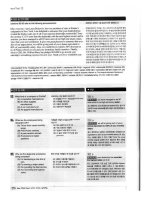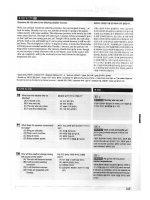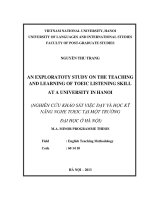TOEIC listening skill p2
Bạn đang xem bản rút gọn của tài liệu. Xem và tải ngay bản đầy đủ của tài liệu tại đây (634.23 KB, 33 trang )
PRACTICAL ENGLISH
LISTENING: Agreeing and disagreeing in meetings
VOCABULARY
stand up to
to express or raise a disagreement
acknowledge
to admit; to declare to be true
defend
to protect against
debate
to discuss two sides of an argument
have a point
to agree to a certain degree
outrageous
beyond reason; not moderate or logical
support
to approve of
reiterate
to repeat or focus on the main or most important points
© Reallyenglish 2013
PRACTICAL ENGLISH
LISTENING: Agreeing and disagreeing in meetings
LISTENING PRACTICE: TRANSCRIPT
Speaker 1:
It gives me great pleasure to introduce Arlene Brown, author of the best-selling
book, Social Influence in Business. Ms. Brown is an expert on maintaining good
business relationships, and her talk today is called "Managing Conflict in Meetings."
Please welcome Ms. Brown.
Speaker 2:
Good morning, everyone. Thanks for coming to our discussion today on "Managing
Conflict in Meetings." I'd like to start this morning with a few tips about being polite
during meetings or debates. As we all know, meetings can sometimes get difficult
when we must discuss topics that we disagree on. So remembering to remain calm
and clear is important.
First, always acknowledge your opponent's ideas and opinions. This can mean
adding phrases like "You have a good point, but…" before bringing up the parts
you disagree with. The mistake that many people make is that they attack their
colleagues and cause problems in the relationship. Also, don't be afraid to stand
up to a popular leader — just be sure to use kind and gracious language. Many
companies worry that, too often, the opinions of popular managers are the loudest
voices heard. But also try to defend unpopular leaders or opinions if you can support
them with logic. Again, using polite language is important in keeping a positive
feeling in the office.
These suggestions seem simple, but time and time again I am surprised at how
angry and uncomfortable people are in meetings. This is often because our language
is not polite, and people are scared to speak up. By being polite but still expressing
your opinion with respect, you can keep a good relationship with all your co-workers.
Next, what phrases can we use when trying to be polite…
© Reallyenglish 2013
PRACTICAL ENGLISH
LISTENING: Being a good project manager
VOCABULARY
sense
a general awareness
understanding
supportive or sympathetic
flexibility
being open to new ideas or willing to change
communication
skills
the ability to communicate effectively
planning meeting
a meeting in which planning for a project is discussed
share an idea
to communicate an idea
present
to give or show
democratic
a style of management in which the leader listens to everyone's
ideas
LISTENING PRACTICE: TRANSCRIPT
Hi, Anna. This is Paul. I'm calling because I want to give you some feedback about
your new job as Project Manager. Sorry I'm leaving this on your voicemail, but I just
finished a meeting about your performance so far, and I am on my way to the airport
now. I wanted to make sure that I communicate this information before I leave. Email
me if you have any questions.
Okay. First, you should have a good sense of how your team members work. Know
their strengths and weaknesses. Second, let everyone have a chance to share their
ideas when doing a planning meeting. It's much better to have ideas from 10
people than from only 2. Being democratic so that every voice is heard is good for
your team, too! Next, it's important to have flexibility, but you should also be firm
when you need to be. Also, present your plan carefully and encourage everyone to
comment on it before it's finalized.
The management is pleased with your performance so far, but if you follow these
suggestions, they will be even happier. I'm back next week, so let's talk about these
issues in more detail then. Thanks Anna!
© Reallyenglish 2013
PRACTICAL ENGLISH
LISTENING: Booking an ecotour
LANGUAGE SUMMARY
Booking a tour 1
If you are interested in booking a tour, you can say:
I'm interested in booking an ecotour.
I'd like to book an ecotour.
I'm interested in finding out more about your ecotours.
Booking a tour 2
If you want some information about the accommodations on a tour, you can say:
Can you tell me about the accommodations?
What are the accommodations like?
Can you describe the accommodations?
Booking a tour 3
If you want to know what activities are available on a tour, you can say:
What kinds of activities does the tour have?
What activities does the tour include?
Does the tour include daily activities?
© Reallyenglish 2013
PRACTICAL ENGLISH
LISTENING: Booking an ecotour
LISTENING PRACTICE: TRANSCRIPT
Tour agent: Thank you for calling Eco-Trips Unlimited. Can I help you?
Customer: Yes, I'm interested in booking an ecotour.
Tour agent: Great. I can help you with that. Where would you like to go?
Customer: We'd like to go to Costa Rica.
Tour agent: All right. We have a tour to Costa Rica.
Customer: What are the accommodations like?
Tour agent: You'll stay in our eco-friendly lodge. The building is set off the ground
so that the plants and animals can continue to grow.
Customer: Does the lodge have electricity?
Tour agent: No, it doesn't, but it does have solar-powered hot showers.
Customer: Oh, that's great. What kind of activities does the tour have?
Tour agent: There is a hike through a cloud forest, a hike to a volcano, and you'll also
go on a treetop tour.
Customer: Wow! That sounds exciting! What's the food like?
Tour agent: The tour includes 3 meals a day — mostly locally grown and cooked in
the local style. It is mostly vegetarian, but there are also some meat options.
Customer: How long is the tour?
Tour agent: We offer five-day or ten-day tours. We have 4 each year that go to Costa
Rica. The next one is in the fall.
Customer: Oh, we're actually interested in going in the winter.
Tour agent: Okay. We have a ten-day tour in February. It leaves on February 7.
Customer: That's perfect.
© Reallyenglish 2013
PRACTICAL ENGLISH
LISTENING: College education
VOCABULARY
graduate
to complete your studies at high school, college, or university
college
a school where you can get a degree
drop out of
college
to stop studying and leave college in the middle of a course
lecture
a talk or presentation to a large group of students by a teacher
major
the main subject that you study at a college or university
graduate student
a student who continues studying at college or university after
finishing his or her first degree
seminar
a small group of students studying with a teacher
freshman
a student in their first year in high school, college, or university
scholarship
money or prize given to a student to pay for part or all of their
studies
degree
a diploma from a college or university after you complete your
studies
© Reallyenglish 2013
PRACTICAL ENGLISH
LISTENING: College education
LISTENING PRACTICE: TRANSCRIPT
A:
Congratulations! I heard you came first in the exams. You did better than more than a
thousand people, and you didn't even go to all the lectures! That's just amazing.
B:
Yeah, I know. I can't believe it. I might be able to get a scholarship to study outside
Canada before I finish my degree here.
A:
Great! Where are you thinking of going?
B:
Well, I'm not sure. Maybe Oxford in England. I could do a business major at the new
business school there. Bill Clinton studied at Oxford, and he had a successful career
after graduating. Maybe I'll become Prime Minister of Canada if I go to Oxford.
A:
Yeah, Oxford sounds good, but don't you want to go to the U.S.?
B:
Well, I'm thinking about scholarships to Harvard, too. But my friend who went to
college in the U.S. dropped out in his freshman year and came back to finish his
degree in Canada. He said not all of his classes were taught by professors — some
of them were taught by graduate students.
A:
Well, good luck. I'm sure you'll have an amazing time wherever you go.
© Reallyenglish 2013
PRACTICAL ENGLISH
LISTENING: Culture and business
VOCABULARY
subsidiary
a branch office
misinterpret
to misunderstand the meaning of something
counterpart
a person who corresponds to you in another office or company
body language
silent messages shown by someone's physical behaviour
reluctance
not wanting to do or accept something
frustrated
causing disappointment and you feel annoyed
etiquette
a set of rules of behavior
tendency
a habit of doing something
expectation
an anticipation of a behavior, action, or result
eye contact
when two people's eyes meet
LISTENING PRACTICE: TRANSCRIPT
Let's wrap up today's presentation on culture and business for new employees. Since
our company has foreign subsidiaries, it's important that you become familiar with
other cultures. Otherwise, you may misinterpret people and run into problems when
you deal with our business counterparts. You may not realize until you learn about
it, for example, that the Japanese are uncomfortable saying "no." They prefer to say
"yes" and rely on body language to communicate reluctance. In Arab countries, "yes"
often means "possibly." It's important for you, as an American, to understand this
cultural difference, otherwise you may feel frustrated.
In many cultures, etiquette plays a very important role. For example, the Japanese
always begin a meeting with greetings and the exchange of business cards. Only
once that's done can the meeting begin. In both Japan and China, it's considered
disrespectful to put others' business cards into your pocket or wallet, or to write
on them.
Countries also have different rules of communication. While here in the United
States, it's considered rude to interrupt, the Italians and the French frequently do
so, and they enjoy the debate. The French sometimes feel that Americans have a
tendency to lecture rather than talk because our expectation is that others will let us
finish before they talk. To learn more, you can visit our Human Resources web page
and click on the "Cultural Differences" link.
© Reallyenglish 2013
PRACTICAL ENGLISH
LISTENING: Fitting into a new culture
VOCABULARY
orientation
informational meeting for new members of a group
active interest
interest shown through action
accumulate
to collect or increase over a period of time
hostility
enemy-like feelings or behavior
overwhelmed
feeling that there is too much to do
accomplishment
something completed successfully
competent
able, proficient, good at what you do
allegiance
a sense of loyalty and belonging
LISTENING PRACTICE: TRANSCRIPT
In today's orientation for international students, we'll talk about the 4 stages of
cultural adaptation.
At first, most international students experience what's known as "the honeymoon
stage." For a few weeks, everything may feel new and exciting. You're taking an
active interest in what surrounds you, and you are feeling eager to please others.
The problem is that sometimes you may give the impression you understand what's
going on, while you actually don't. When your feelings of confusion accumulate,
they lead to what's known as "the hostility stage."
At this point, you may feel overwhelmed by cultural differences, and language may
be part of the problem. Everyday language is different from what you learn in a
textbook, and nothing can prepare you for the amount of language you're exposed
to. Feelings of frustration, annoyance, and even anger are common. But as you find
solutions to problems, your feelings of accomplishment lead to a third stage, the
"integration, or acceptance, stage."
In this third stage, within a few months, you start to feel more relaxed. You're making
new friends, finding activities you enjoy, and finishing up term papers. You feel more
confident that you can take care of yourself.
Finally, one day you reach "the home stage." You feel comfortable and competent in
your new culture, while retaining your allegiance to your own culture of origin.
© Reallyenglish 2013
PRACTICAL ENGLISH
LISTENING: Getting help from a counselor
VOCABULARY
resource
a product or service that you can use to help you do work or
achieve a goal
flyer
a one-page announcement with details about an event or product
concern
a worry you have about an issue or a problem
keep up (with)
to stay at the same level as; to stay equal to
cope (with)
to manage a difficult situation with some success
workload
the amount of work you have
study habits
how you study on a regular basis
command
a good knowledge of something and the ability to use it
resident advisor
a person who lives on campus and provides advice to students
first come, first
served
a system in which the first person to arrive is the first person to
get a service
© Reallyenglish 2013
PRACTICAL ENGLISH
LISTENING: Getting help from a counselor
LISTENING PRACTICE: TRANSCRIPT
I'd like to welcome you all and thank you for coming. You are all in your first year
from abroad. The university offers several types of counseling services that I would
like to recommend to you.
The International Student Office offers resources to help you adapt to your new
university and culture. At this office, you can get flyers on cultural and social events
where you can meet other international students. You can also ask to speak with a
counselor who'll listen to your concerns, help you identify solutions, and even pair you
up with a "buddy," an American student who'll guide you through life in this country.
The Office of Academic Affairs offers academic counseling. If you're having
difficulties keeping up with lectures or coping with your workload, a counselor will
help you strategize your study habits and point you to specific language resources,
such as the language lab and language tutors, to help you improve your command
of English.
The Office of Student Life is made up of graduate student volunteers who are
finishing up their programs and have lived as resident advisors for at least 3 years.
They have experience counseling undergraduates with personal, social, or academic
issues. They're available 5 days a week for free, private consultations on a first come,
first served basis.
© Reallyenglish 2013
PRACTICAL ENGLISH
LISTENING: Homestay: Living with a family
VOCABULARY
authentic
real; not fake
commute
the time spent traveling to work or school
cuisine
style of cooking
homestay family
a family that takes an international student in to live with them
inform
to give or tell someone information
native
belonging to a particular place or culture by birth
pros and cons
the good and bad sides of a situation (pros are good; cons are bad)
unique
the only one of its kind
© Reallyenglish 2013
PRACTICAL ENGLISH
LISTENING: Homestay: Living with a family
LISTENING PRACTICE: TRANSCRIPT
Wei: Hey, Lin Jing!
Lin Jing: Hi, Wei, how are you?
Wei: I'm fine. I'm just trying to decide whether to live in an apartment or with a
homestay family next year when I study abroad in the U.S.
Lin Jing: Oh, that's a difficult decision. I lived in an apartment when I went last year,
and it was a lot of fun. I got to do whatever I wanted to, and I didn't have to inform
my family where I was going all the time.
Wei: Hmm. That's nice.
Lin Jing: The other thing is that my apartment was right near the school, but most of
the people that lived with homestay families had long commutes.
Wei: Maybe I should live in an apartment…
Lin Jing: But my friends who lived with homestay families had great experiences,
too.
Wei: Really? What did they say about it?
Lin Jing: Well, first of all, they were living with native English speakers, so they
practiced speaking English all the time.
Wei: Oh, that's great!
Lin Jing: They also ate authentic meals every day…and it wasn't just hamburgers!
Americans eat all different types of food!
Wei: Really?
Lin Jing: Yes! They even eat Chinese foods sometimes, so you don't have to miss the
food from home! The other great thing was that my friends who lived with homestay
families got invited to events that the people in apartments didn't get to go to. This
meant that each one of those friends had a unique experience.
Wei: Hmm…It is a difficult decision. There are a lot of pros and cons.
Lin Jing: Yes, there are. Well, good luck making your decision!
Wei: Thanks!
© Reallyenglish 2013
PRACTICAL ENGLISH
LISTENING: Keeping safe
VOCABULARY
carry-on bag
a small bag you take on an airplane with you
common sense
the ability to make good decisions based on what you know
about the world
congested
overcrowded; blocked
excessive
too much
hitchhike
to get a ride from someone you don't know
mindful
aware; paying attention to things around you
purposeful
having a reason for what you do
stranger
a person you do not know
© Reallyenglish 2013
PRACTICAL ENGLISH
LISTENING: Keeping safe
LISTENING PRACTICE: TRANSCRIPT
Radio announcer: You're listening to LifeTalk Radio. Today we have special guest,
Rachel Johnson, here with us from the Center for International Studies. Ms. Johnson
is here to talk to us today about how to stay safe while living abroad. Welcome,
Ms. Johnson.
Ms. Johnson: Thank you.
Radio announcer: So, what are some of the ways that students can stay safe while
living abroad?
Ms. Johnson: Well, first let me say that living abroad is a wonderful opportunity to
learn about another language and culture. I recommend it for any young person
who is interested in learning about the world. But it is important to be well-prepared.
Staying safe starts before the trip, when you're packing. You should pack any
important medication, a copy of your passport, and an extra set of passport photos
in your carry-on bag. Also, if you wear glasses or contact lenses, you should bring an
extra pair with you.
Radio announcer: This all makes a lot of sense to me. Staying safe starts with
being prepared.
Ms. Johnson: That's right. Then, once you are in another country, you should use the
same common sense that you would at home.
Radio announcer: What do you mean by that?
Ms. Johnson: Well, for example, be mindful in congested places, try not to travel
alone at night, and don't hitchhike or accept rides from strangers. Also, keep
emergency telephone numbers with you, and make sure you know how to use the
local phones.
Radio announcer: I see. Those are good suggestions.
Ms. Johnson: One other important thing is that you shouldn't carry excessive
amounts of cash around. Carry a little cash, and a credit card or traveler's checks.
Radio announcer: Well, thank you, Ms. Johnson, for this useful information.
Ms. Johnson: You're welcome.
© Reallyenglish 2013
PRACTICAL ENGLISH
LISTENING: Making speeches
VOCABULARY
tell a story
to speak about something interesting or funny that has happened
suggest
to tell someone about a plan or idea that you want someone to
think about
claim
to say something is true, but you do not know for sure
introduce
to tell someone what your name is and who you are when you
first meet
welcome
to be friendly to someone when they arrive somewhere
believe
to feel sure that something is true
discuss
to talk about something seriously — usually to reach a decision
explain
to make something clear or easy to understand
LISTENING PRACTICE: TRANSCRIPT
Female addressing audience:
Our next speaker suggests that, in the future, learning will not take place at your
desk or in the classroom. He believes that we will soon be able to use our cell
phones, or Palms, to study any time, anywhere. M-learning is learning through
mobile computers such as cell phones.
I'd like to introduce you to Professor Wolfgang Steiner from the Computing
Department at the University of Kansas. He's going to explain more about
"m-learning." Please welcome Professor Steiner.
Male speaker:
Hands up if you don't have a cell phone. Mmm. Not surprising. The cell phone
companies claim that almost 70 percent of the U.S. population has a cell phone.
Now, I'm going to tell you a story…
…Mobile learning, or "m-learning", is the future of learning.
Female:
Thank you, Professor. If you would like to discuss m-learning with Professor Steiner,
you can meet him in Room 9 at 3 o'clock.
© Reallyenglish 2013
PRACTICAL ENGLISH
LISTENING: Mining and metals
VOCABULARY
metal
a type of substance that is hard and shiny, like steel or gold
gold
a precious, yellow metal used for making coins and jewelry
silver
a valuable gray-white metal used for making coins and jewelry
iron
a hard, strong metal used for making steel
mine
a deep hole under the ground where minerals or metals are
excavated
jewelry
objects like rings, necklaces, and earrings
miner
a person who works underground, excavating coal or gold,
for example
mining
the industry of getting minerals or metals out of the ground
LISTENING PRACTICE: TRANSCRIPT
Hi, my name's Bob. My grandfather opened this jewelry store in 1956. We make and
sell a large variety of rings, earrings, necklaces, and bracelets. We use a lot of different
metals to make our jewelry. We use gold, silver, and other precious metals. We use
lots of different stones in our jewelry, too. Diamonds are always popular.
The business started as a small mining company, extracting iron and other minerals
from the ground. We don't do mining any more — we have 20 jewelry stores across
the U.S. instead.
Where do we get our metals from? Well, the most valuable metal that we use
— that's gold — comes from mines in South Africa. Everyone loves gold — it is
beautiful and very easy to work with because it is very soft. We also use silver, which
is a lot cheaper and very popular. Our silver is mined in Mexico, but we buy all our
metals from an international company.
We have a busy workshop with experienced designers doing some exciting work. My
grandfather would be amazed to see how we now sell our products everywhere by
mail, and also through our website.
© Reallyenglish 2013
PRACTICAL ENGLISH
LISTENING: Online gaming
VOCABULARY
virtual world
a world which only exists online or on a computer
word game
a game involving making or guessing words
multiplayer
a game with more than two players
roleplaying
a game where each player is a character in a world
opponent
the person who plays against you in a game
move
the taking of a turn or change of position in a game
real-time
a move is made in a game whenever you want, not in turns
avatar
a computer character which represents you or your player in a
game or chat
© Reallyenglish 2013
PRACTICAL ENGLISH
LISTENING: Online gaming
LISTENING PRACTICE: TRANSCRIPT
Though many feel that video games are just a fun way to spend some time, scientists
are now beginning to study how video games can help improve health. In 2007, the
Gaming Health Institute received $2 million to study how patients with brain cancer
and other diseases can use video games to help move their hands more effectively.
There are many different types of research being done now.
First, scientists are interested in how the brain helps move the hands while the eyes
watch the screen. When it's the player's turn to move, scientists study what happens
in the brain. In addition, word games that make one think hard about language can
have some health benefits for the brain. Many scientists believe that this kind of
activity can help the brain heal after accidents or disease causes damage to parts of
the brain.
More than this, scientists wonder what happens when a patient with a brain disease
lives for hours in a virtual world where moving and talking are not made more
difficult by real-time brain problems. Does the player feel more confident and happy
in this virtual world?
Can a pretty or handsome avatar with no real-life problems give a sick person more
confidence? Can winning a game against an opponent make someone with disease
stronger and healthier? These are just some of the questions that scientists are
excited about researching.
Scientists at the Gaming Health Institute hope that by studying the brain and video
games in detail, they can come up with some answers to help make healing useful,
effective, and fun!
© Reallyenglish 2013
PRACTICAL ENGLISH
LISTENING: Operating a TV set
VOCABULARY
plug it in
you do this when you connect a machine to a power source
turn it on
you do this when you press the on button so that you can watch
TV for example
ad
an advertisement or TV commercial between programs
turn it down
you do this when the volume is too loud — TV or music
remote control
you use this device to control your TV
record
you do this when you copy a program onto a DVD or video so
that you can watch it later
documentary
a program on one news story
change the
channel
you do this when you want to watch a different TV station
favorite program
the program you like best on TV
© Reallyenglish 2013
PRACTICAL ENGLISH
LISTENING: Operating a TV set
LISTENING PRACTICE: TRANSCRIPT
Nicole:
So, Kirsty, what are we going to watch on TV tonight?
Kirsty:
Nothing right now! I just turned the TV on and there's no picture!
Nicole:
Oh, no! I can't miss Friends — it's my favorite program. Are you sure the TV's
plugged in?
Kirsty:
Yes, of course. And before you ask, I turned it on, too.
Nicole:
Should I call Jim? He's always good at fixing things…and he lives really close by.
I'm sure he won't mind.
Kirsty:
Okay, go ahead.
Nicole:
Hey, Jim, it's Nicole. Are you busy?…Yes, I know there's a baseball game on, but our
TV isn't working and we don't know why…Yes, of course we did, but there's still no
picture…Thanks so much, you know where we live…Okay, see you soon. Thanks a
lot. He's coming over in a minute.
Kirsty:
Great, there's a documentary about dinosaurs at 9:30. I don't want to miss it.
Nicole:
Kirsty, you know I want to watch Friends!
Kirsty:
Not that! I'm so sick of that show. I like to learn things. You can't learn anything from
a comedy show.
Nicole:
Why don't you record it? Then you can watch it later.
Kirsty:
Okay, I don't mind. But we can't watch anything right now.
[doorbell sounds]
Kirsty:
Hey, that's Jim!
© Reallyenglish 2013
PRACTICAL ENGLISH
LISTENING: Renting an apartment
VOCABULARY
rent
the money you pay every month for an apartment
the twentieth
floor
20th level in a building
unfurnished
without furniture like chairs and tables
air-conditioned
the temperature in a building is controlled by a machine
balcony
the outside part of an apartment above the first floor where you
can sit and look at the view
landlord
the person who owns the apartment you rent
deposit
the money you pay as a guarantee when you rent an apartment
non-smoker
someone who does not smoke
elevator
an apparatus that takes you up and down the floors of a building,
so you do not need to walk
stairs
part of a building that you walk up or down to get to another floor
LISTENING PRACTICE: TRANSCRIPT
Hey! Look at this one! It's near the university and the park, and very close to where
you work, John. It says it's a five-minute walk to the station and a twenty-minute
train ride to the city center. It's on the ninth floor…don't worry, it has an elevator
so you don't need to use the stairs. There are 2 big bedrooms…The apartment is
unfurnished. It has a balcony and it's air-conditioned. It says non-smokers preferred
and no pets. I think it will be perfect for us. Now, let's see…the rent…It's $4,000 a
month, and you have to pay a deposit of $2,000 as well. The landlord's number's
here. Let's phone him and see if we can go and see it this afternoon…
© Reallyenglish 2013
PRACTICAL ENGLISH
LISTENING: Sales activities
VOCABULARY
calculate sales
figures
to find out how much money a company makes from selling its
products
make a
presentation
to give a formal talk to a group of people — about a new
product, for example
meet a client
to go to talk to a customer face-to-face
make a call
to use the telephone to speak to someone
send out a
brochure
to mail a small book of product information — to clients, for
example
sales target
the money you want to make or the number of products you
want to sell — every month, for example
sales team
a group of people who work together to sell a company's products
salesman /
saleswoman
a man or woman who sells things
LISTENING PRACTICE: TRANSCRIPT
OK. Welcome to our sales team everybody! My name's Janet and I'm the Sales
Manager. Now, I'll tell you about our work in Sales. Are you ready?
We sell our software products to small companies. We advertise on the Internet.
Our sales people make a lot of calls to companies. Then we send them our lovely
brochures.
We always try to arrange a meeting with new clients. At the meeting, we can talk
about our clients' needs. We also make an exciting presentation about our products.
Are you still awake?!
Hopefully, they'll think 'Oh, great! These guys are really good!' Then we can reach
an agreement.
At the end of each month, you should calculate your sales figures and give me
your sales report. If you reach your sales target, I'll buy you a bottle of champagne!
Everybody likes champagne, right?
© Reallyenglish 2013
PRACTICAL ENGLISH
LISTENING: Social networking and your business
VOCABULARY
acquaintance
someone you know, but who is not a close friend
associate
a colleague in a business
benefit
to help; to have a positive effect
contact
someone through whom you can get access to information,
favors, or important people
join
to become a member of a group or organization
mutual
shared; in common
network
a group of people who are connected through professional or
personal interests
referral
a recommendation of a person or business to another
LISTENING PRACTICE: TRANSCRIPT
Most of you have probably heard of social networking sites that are mostly used for
socializing and dating. However, there are many other social networking sites that
are designed for business and networking purposes as well. Creating an account
with one of these sites is easy and it can greatly benefit your business. Once you
set up your account, you can build a network of business associates. You do this by
checking to see which of your colleagues and acquaintances also have accounts.
Then you invite them to join your network. Through the people in your network, you
can add mutual associates, people whom you have never met, which can be helpful
in job hunting and building your business. Another benefit is that by building a
network of contacts in your field, you can assist customers in referrals to related
services. This creates a better service for your customers. In addition, you can receive
helpful referrals from other people in your network.
© Reallyenglish 2013
PRACTICAL ENGLISH
LISTENING: Social networking: protecting yourself
VOCABULARY
victim
a person who is hurt or harmed by another person or thing
profile
an outline that tells the most important facts about a person or
organization
protect
to keep safe from something or someone
scam
a situation in which one person cheats another person
avoid
to stay away from something that is not a good idea
anonymity
not known by other people
identity theft
a crime in which someone uses another person's name and other
information such as bank and credit card numbers
post
to put up for display on a website
© Reallyenglish 2013









